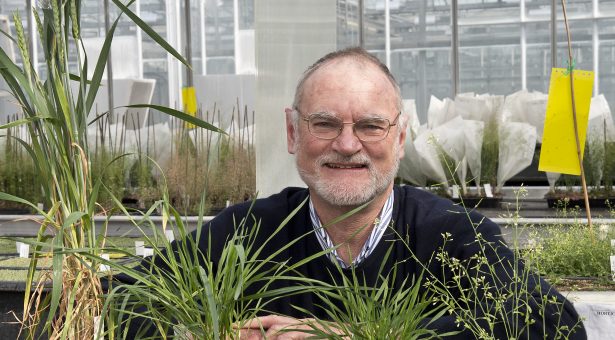Queen’s Birthday Honours recognition for Professor Michael Bevan FRS

Professor Michael Bevan FRS is today honoured for his scientific contributions in the Queen’s Birthday Honours List.
Professor Bevan is appointed as an Officer of the Order of the British Empire (OBE) for services to plant genomics.
The John Innes Centre scientist has made world-leading contributions to plant genetics and genomics.
Director of the John Innes Centre, Professor Dale Sanders FRS said: “I am delighted that Mike’s exceptional and sustained contributions to plant sciences have been recognised in this way. The technologies and biological insights that he has developed have provided invaluable resource for the global plant science research community and brought wider societal benefit through his work on the wheat genome.”
In his early career Professor Bevan developed gene transfer methods for plants that changed the way researchers studied genes. For this work, which provided the foundations of the plant biotechnology industry, he won the Rank prize for Nutrition in 1987.
Later in his career at the John Innes Centre Professor Bevan initiated and lead international efforts to complete the sequence of Arabidopsis thaliana in 2000. For this work he and his colleagues won the Kumho Award in 2001.
Arabidopsis was the first plant to have its genome sequenced, which facilitated the direct identification of essentially all genes in a plant and fundamentally changed the way scientists investigate evolution, crop domestication and basic biochemical mechanisms in plants.
Major advances in DNA sequencing technologies provided an opportunity to sequence the complex genomes of important crops such as wheat. Professor Bevan collaborated with a small team of European researchers who generated an initial view of the wheat genome, the largest and most complex genome to have been sequenced. The outcome of this first wheat genome analysis was instrumental in developing large-scale genetic marker systems that are now widely used by the wheat breeding industry.
Subsequently, Professor Bevan initiated a new approach to sequencing the wheat genome together with colleagues in the Earlham Institute. This project was the first to accurately identify nearly all of the genes in wheat. This work has enabled the identification of many new genes in wheat that are useful for disease resistance, adaptation to drought and for increasing the yield and nutrition of wheat grains. In 2018 Professor Bevan was awarded with the Genetics Society Medal in recognition of these impacts.
Professor Bevan became Head of the Molecular Genetics Department at the Plant Breeding Institute in Cambridge, continuing when the laboratory transferred to Norwich to become part of the John Innes Centre. He then became leader of an Institute Strategic Programme and Deputy Director of the John Innes Centre, stepping into the role of director as required.
In addition to his world-leading scientific work, Professor Bevan has undertaken many international community activities that promote plant science in Europe and provides advice to research organisations, funding agencies and the plant biotech industry.
Professor Bevan was born in Otorohanga, New Zealand where his family farmed. His long-term interest in agriculture and plants arise from these early experiences. He was educated at Auckland University, obtained a PhD from Cambridge University in plant biochemistry. He worked in the USA with Mary-Dell Chilton at Washington University in St Louis, where he helped to develop plant gene transfer technologies.



